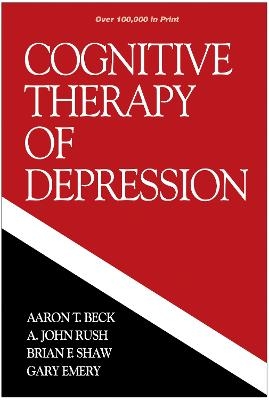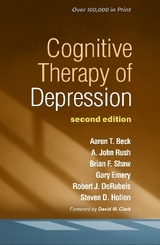
Cognitive Therapy of Depression, First Edition
Guilford Publications (Verlag)
978-0-89862-919-4 (ISBN)
- Titel erscheint in neuer Auflage
- Artikel merken
This bestselling, classic work offers a definitive presentation of the theory and practice of cognitive therapy for depression. Aaron T. Beck and his associates set forth their seminal argument that depression arises from a "cognitive triad" of errors and from the idiosyncratic way that one infers, recollects, and generalizes. From the initial interview to termination, many helpful case examples demonstrate how cognitive-behavioral interventions can loosen the grip of "depressogenic" thoughts and assumptions. Guidance is provided for working with individuals and groups to address the full range of problems that patients face, including suicidal ideation and possible relapse.
Aaron T. Beck, MD, is the founder of cognitive therapy, University Professor Emeritus of Psychiatry at the University of Pennsylvania, and President Emeritus of the Beck Institute for Cognitive Behavior Therapy. Dr. Beck is the recipient of awards including the Albert Lasker Clinical Medical Research Award, the Lifetime Achievement Award from the American Psychological Association, the Distinguished Service Award from the American Psychiatric Association, the James McKeen Cattell Fellow Award in Applied Psychology from the Association for Psychological Science, and the Sarnat International Prize in Mental Health and Gustav O. Lienhard Award from the Institute of Medicine. He is author or editor of numerous books for professionals and the general public. A. John Rush, MD, is Professor Emeritus at Duke–NUS Medical School, National University of Singapore, and Adjunct Professor in the Department of Psychiatry and Behavioral Sciences at Duke Medical School. His research has focused on the diagnosis and psychotherapeutic, psychopharmacological, and somatic treatment of depression and other mood disorders. Dr. Rush's internationally recognized work has received numerous awards. Brian F. Shaw, PhD, is a Professor in the Departments of Psychiatry and Public Health Sciences at the University of Toronto, and a member of the graduate faculty in the Institute of Medical Science, University of Toronto. Gary Emery, PhD, is director of the Los Angeles Center for Cognitive Therapy and Assistant Clinical Professor in the Department of Psychiatry at UCLA.
1. An Overview
2. The Role of Emotions in Cognitive Therapy
3. The Therapeutic Relationship: Application to Cognitive Therapy
4. Structure of the Therapeutic Interview
5. The Initial Interview
6. Session by Session Treatment: A Typical Course
of Therapy
7. Application of Behavioral Techniques
8. Cognitive Techniques
9. Focus on Target Symptoms
10. Specific Techniques for the Suicidal Patient
11. Interview with a Depressed Suicidal Patient
12. Depressogenic Assumptions
13. Integration of Homework into Therapy
14. Technical Problems
15. Problems Related to Termination and Relapse
16. Group Cognitive Therapy for Depressed
Patients
Steven D. Hollon and Brian F. Shaw
17. Cognitive Therapy and Antidepressant
Medications
18. Outcome Studies of Cognitive Therapy
Appendix: Materials
*The Beck Inventory
*Scale for Suicide Ideation
*Daily Record of Dysfunctional Thoughts
*Competency Checklist for Cognitive Therapists
*Possible Reasons for Not Doing Self-Help
Assignments
*Research Protocol for Outcome Study at Center
for Cognitive Therapy
*Further Materials and Technical Aids
| Erscheint lt. Verlag | 25.12.1987 |
|---|---|
| Reihe/Serie | The Guilford Clinical Psychology and Psychopathology Series |
| Verlagsort | New York |
| Sprache | englisch |
| Maße | 152 x 229 mm |
| Gewicht | 620 g |
| Themenwelt | Geisteswissenschaften ► Psychologie ► Klinische Psychologie |
| ISBN-10 | 0-89862-919-5 / 0898629195 |
| ISBN-13 | 978-0-89862-919-4 / 9780898629194 |
| Zustand | Neuware |
| Informationen gemäß Produktsicherheitsverordnung (GPSR) | |
| Haben Sie eine Frage zum Produkt? |
aus dem Bereich



